In Memoriam: Golfing Greats We Lost In 2020
Including, Peter Alliss, Pete Dye, Mickey Wright and Doug Sanders
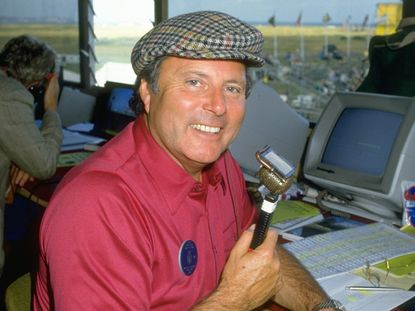

We remember some great figures from the world of golf who passed away this year, including Doug Sanders, Pete Dye, Mickey Wright and Peter Alliss.
In Memoriam: Golfing Greats We Lost In 2020
At the end of one of the strangest and most challenging years most of us can recall, we take a moment to remember some of the notable figures from the world of golf who died in 2020.
Pete Dye
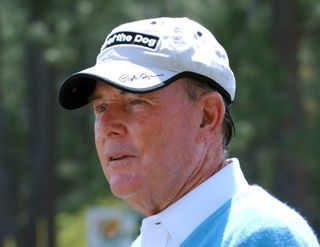
Born: 29th December 1925 Urbana, Ohio Died: 9th January 2020 La Romana, Dominican Republic
Pete Dye, who died in January at the age of 94, was is responsible for the design of over 100 courses, including some of the most famous in the world.
His works include TPC Sawgrass, Harbour Town Links at Hilton Head, the Ocean Course at Kiawah Island and Whistling Straits.
Get the Golf Monthly Newsletter
Subscribe to the Golf Monthly newsletter to stay up to date with all the latest tour news, equipment news, reviews, head-to-heads and buyer’s guides from our team of experienced experts.
Dye grew up in Ohio and learnt to play golf on a nine-hole course built by his father.
It was there where he fell in love with the game, watering the greens with a garden hose.
Dye would go on to become a fine player.
He won the Indiana State Amateur and played in the U.S. Open as well as six US Amateur Championships.
Pete Dye first met Jack Nicklaus when he was just 16 and the pair went on to become great friends and design partners.
Dye began designing courses in the 1950s and did so with his wife Alice. They started with the modest El Dorado south of Indianapolis.
In the 1960s, he travelled to Scotland where he was inspired by the country’s historic and dramatic courses and applied what he saw there to his work.
Dye is recognised as one of the all-time greats in the field of course design with a phenomenal portfolio of work.
In 2008 he became only the fifth golf course designer to be inducted into the World Golf Hall of Fame—joining Donald Ross, Alister MacKenzie, C.B. Macdonald and Robert Trent Jones.
His golf courses have hosted and still do host Majors, WGC tournaments and PGA Tour events.
Mickey Wright
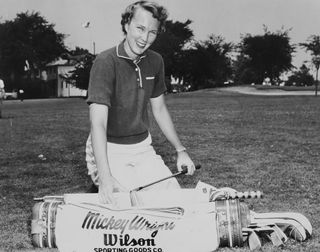
Born: 14th February 1935 San Diego, California Died: 17th February 2020, Florida
For a spell in the early 1960s Mickey Wright was untouchable on the LPGA Tour.
She topped the money list four seasons in a row from 1961 to 1964 and won an astounding 44 tournaments on the circuit in that time.
In total she won 82 LPGA Tour events, second only to Kathy Whitworth on the all-time list. She won 13 Major titles.
Ben Hogan described Wright’s swing as the best he ever saw and many, including Kathy Whitworth, felt Wright could have won over 100 tour events had she not chosen to step back from competitive golf in 1969 at the age of 34.
She served as president of the LPGA in 1963 and 1964 and through her career she worked tirelessly to promote women’s professional golf.
John O’Leary
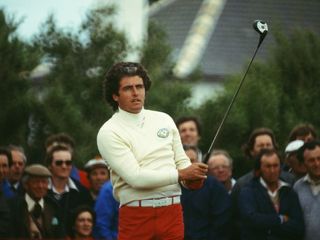
Born: 18th August 1949, Dublin, Ireland Died: 26th March 2020, Esher, Surrey
Winner of the 1982 Irish Open at Portmarnock Golf Club, John O’Leary played on the European Tour for over two decades, making a total of 332 appearances on the circuit.
Having won the South of Ireland Open Amateur Champioship, O’Leary turned professional in 1970 and played in the 1971 Open Championship at Royal Birkdale.
After the first round he was just a shot off the lead, although he faded to a tie for 40th.
O’Leary played his first season on the European Tour in 1972 but earned his first win on the South Africa Tour in the 1975 Holiday Inns Royal Swazi Sun Open.
That year, O’Leary also picked up a runner-up finish in the Open de France and qualified to play in the 1975 Ryder Cup in at Laurel Valley in Pennsylvania.
He won the European Tour’s Greater Manchester Open in 1976 but his greatest triumph came at Royal Portmarnock in 1982 when he became only the third Irishman to win his national open, following Harry Bradshaw and Christy O’Connor Jnr.
Although he retired as a touring professional in 1989, O’Leary continued to contribute to the game – sitting on the Board of Directors for the European Tour right up until 2019.
Doug Sanders
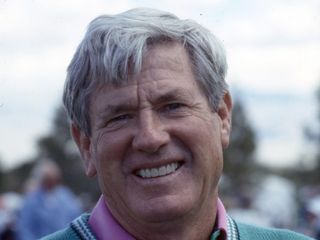
Born: 24th July 1933 Cedartown, Georgia Died: 12th April 2020 Houston, Texas
George Douglas (Doug) Sanders was 36 when he arrived in St Andrews to contest the 1970 Open Championship.
He had 18 PGA Tour titles to his name including the 1956 Canadian Open, an event he won as a 22-year-old amateur.
He was one of the best-known professionals in the world with an established career.
Unfortunately for Sanders, the moment he is most remembered for was yet to come.
On the 72nd hole of the Championship he had two putts from the back of the green to take the title.
He coaxed his first effort down the hill, but it came up three feet short. He crouched over the par attempt for what seemed an eternity then was distracted by something on his line.
He bent down and removed a blade of grass before resuming his pose and eventually taking the club away.
He watched on in agony as the putt slipped past the right edge of the hole.
A closing bogey put him back into a tie with Jack Nicklaus forcing an 18-hole playoff the following day.
It came down to the wire but, with a birdie on the 18th, Nicklaus took it by a shot and famously launched his putter skyward in celebration.
Sanders was left to rue the opportunity he squandered on that same green the previous day.
“Sometimes it doesn’t cross my mind for a full five minutes,” he joked, years later.
Nicknamed “The Peacock of the Fairways” Sanders was well known for his fashionable attire and in 1973 Esquire Magazine named him as one of America's “Ten Best Dressed Jocks.”
Sanders recorded 13 top-10’s in Majors (including four runners-up finishes) and in fact only missed seven Major cuts in his entire career too. He won 20 tournaments as a professional.
He was also part of the famous 1967 Ryder Cup team that obliterated Great Britain by 23.5 points to 8.5. Sanders himself won two points from five matches.
From 1978 Sanders sponsored The Doug Sanders International Junior Championship – an event that has produced winners including Steve Elkington and Adam Scott.
Sanders was a great champion, a style icon and a philanthropist. Our thoughts should focus on 60 years of achievement rather than the 60 seconds Sanders found so hard to forget.
Gordon J. Brand
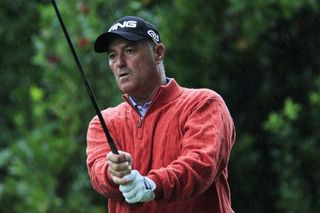
Born: 6th August 1955 Died: 11th August 2020
Born in Cambridge, Gordon J. Brand represented Europe at the 1983 Ryder Cup and won six times across the main European Tour and the European Senior Tour.
Brand won seven times on the European Tour-affiliated Safari Tour from 1981 to 1990, including three Ivory Coast Opens and two Nigeria Opens.
He made more than 450 appearances on the European Tour and almost 200 starts on the senior tour.
He finished second to Greg Norman at the 1986 Open at Turnberry, in the same year he finished in a career-best fifth on the European Tour Order of Merit.
Brand’s one victory on the main European Tour came at the 1989 Belgian Open, where he beat fellow Englishman Mark Davis by six strokes.
He played for England in the World Cup and was part of the winning 1987 English Dunhill Cup team alongside Nick Faldo and Howard Clark.
Brand briefly became a referee on the European Tour before turning 50 and heading to the Senior Tour where he found success.
He secured five victories on the senior circuit at Woburn and Slaley Hall in England together with wins in Spain, Barbados and Abu Dhabi.
Peter Alliss
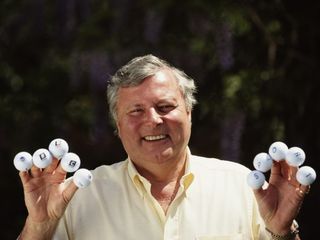
Born: 28th Feburary 1931 Berlin, Germany Died: 5th December 2020 Hindhead, Surrey
For most reading this, certainly for the author, Peter Alliss delivered the soundtrack for the tournaments that fostered and bolstered our interest in golf.
The Duel in the Sun, Seve pumping his fist at St Andrews, Faldo lofting his arms at Augusta, Jean van de Velde at Carnoustie in 1999, Tiger’s early roars: For British golf fans, the honeyed tones of Peter Alliss provided the narration.
Alliss was the last of a great cohort of commentators whose voices personified sport on the BBC in the late 20th Century.
Just as we had Bill McLaren at Murrayfield, Dan Maskell at Wimbledon and Peter O’Sullevan at Aintree, we had Peter Alliss at St Andrews.
He described golf in a uniquely characterful fashion that lifted the action and drew out smiles in sitting rooms across the country. The game will not be quite the same without him.
Before picking up the mic in the BBC booth, Alliss had followed his father Percy’s footsteps, becoming a professional golfer.
In a playing career spanning four decades, Peter won 31 tournaments and was twice winner of the Harry Vardon Trophy for leading the order of merit.
He finished in the top-10 at The Open Championship on four occasions.
In eight appearances at the Ryder Cup, Alliss won 10 matches, including victories over Arnold Palmer (two of them), Billy Casper and Ken Venturi.
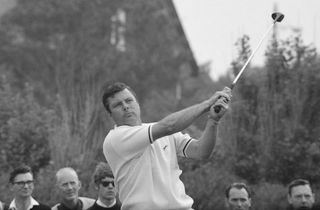
One of his regrets was never captaining a Ryder Cup side. Most agreed it was a task he would have completed with aplomb.
When it came to the sport of golf then, Peter knew what he was talking about.
His first foray into commentary came at The Open Championship of 1961.
It was a good place to start, with Arnold Palmer taking the title and reigniting international, particularly American, interest in the game’s oldest championship.
Alliss worked alongside Henry Longhurst, who had a significant influence on Peter’s commentary, before becoming the BBC’s head golf commentator in 1978. He continued to work with the BBC up to the last, providing words for highlights of the 2020 Masters.
Alliss commentated in a way that resonated with viewers. He understood how the common golfer struggled with the game and described elite action so we could relate.
He mentioned clubs and courses around the country, recalled old friends and acquaintances and mixed amusing anecdotes into the dialogue.
There have been commentators who knew, or know more about the technical side of golf, swing mechanics and equipment advances; Those more able to speak with authority about coefficient of restitution or the one-piece takeaway.
But none of them could capture a moment or paint a picture with words like Alliss.
Whether he was describing a spectator’s jaunty hat or Jean Van de Velde’s Carnoustie meltdown, he did so with feeling, colour and humour.
His style was not, like with many modern commentators, to provide an incessant monologue, unnecessarily describing action the viewers can see for themselves.
Rather, he would add to the moment when he felt it necessary, say very little when there was no need. He chose his words and timing, rather than deliver a stream of consciousness.
That was something he learned from Longhurst, who was generally circumspect in the booth; a philosophy that less is often more.
Some thought Alliss old fashioned, and that’s because he was.
He was born in the year Al Capone was sent to prison after all.
He lived through wartime and its aftermath and his jovial commentary often provided a gentle reminder that golf is a pastime.
Yes, great fun and sometimes enthralling, but perhaps not the be all and end all… Worse things have happened at sea and all that.
Above all else, Allis made us laugh.
Whether it was a humorous quip, a witty observation, or even, latterly, a wee slip that showed he grew up in that different age mentioned above, he was always out to make viewers chuckle.
He made golf fun and that was the key to his enduring appeal, and why Peter Alliss is the best golf commentator there has ever been.
If you haven't seen it, his 2012 World Golf Hall of Fame speech is a must-watch:
https://www.youtube.com/watch?v=N_HSJ8niuKE
For all the latest equipment news and reviews, be sure the follow Golf Monthly on Facebook, Twitter and Instagram.

Fergus is Golf Monthly's resident expert on the history of the game and has written extensively on that subject. He is a golf obsessive and 1-handicapper. Growing up in the North East of Scotland, golf runs through his veins and his passion for the sport was bolstered during his time at St Andrews university studying history. He went on to earn a post graduate diploma from the London School of Journalism. Fergus has worked for Golf Monthly since 2004 and has written two books on the game; "Great Golf Debates" together with Jezz Ellwood of Golf Monthly and the history section of "The Ultimate Golf Book" together with Neil Tappin , also of Golf Monthly.
Fergus once shanked a ball from just over Granny Clark's Wynd on the 18th of the Old Course that struck the St Andrews Golf Club and rebounded into the Valley of Sin, from where he saved par. Who says there's no golfing god?
-
 'Gator Netting Is In Place' - Chevron Championship Venue Prepared For 'Safe' Winner's Jump
'Gator Netting Is In Place' - Chevron Championship Venue Prepared For 'Safe' Winner's JumpA tradition which began at the tournament's previous home could continue this year - if the champion is feeling brave enough...
By Jonny Leighfield Published
-
 New Balance 997 SL Golf Shoe Review
New Balance 997 SL Golf Shoe ReviewNew Balance produce some extremely stylish footwear and, in this review, Matt Cradock takes their spikeless 997 SL onto the course
By Matt Cradock Published
-
 7 Most Annoying Golf Playing Partners
7 Most Annoying Golf Playing PartnersWe showcase the seven most annoying playing partners that golfers can have the misfortune of teeing it up with!
By Sam Tremlett Published
-
 How To Clean Golf Clubs And Grips
How To Clean Golf Clubs And GripsIf you want to know how to clean golf clubs and grips, check out this step-by-step guide
By Sam Tremlett Published
-
 In Praise Of Golfing In Winter
In Praise Of Golfing In WinterFergus Bisset on why he enjoys playing golf through the winter months
By Fergus Bisset Published
-
 'Why Do Golfers Only Wear One Glove?' You Asked Google And We've Got The Answer...
'Why Do Golfers Only Wear One Glove?' You Asked Google And We've Got The Answer...You asked Google and we've got the answer...
By Roderick Easdale Published
-
 How To Regrip Golf Clubs
How To Regrip Golf ClubsKnowing how to regrip golf clubs means you can afford to replace them as and when they need replacing
By Joe Ferguson Published
-
 The 7 Scariest Shots in Golf
The 7 Scariest Shots in GolfWith Halloween creeping up, we have selected the 7 scariest shots in golf
By Neil Tappin Published
-
 17 Ways To Tell You're Obsessed With Golf
17 Ways To Tell You're Obsessed With GolfThe tell-tale signs that you are a true golf fanatic
By Roderick Easdale Published
-
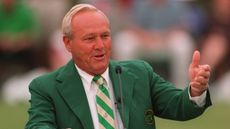 10 Of The Best Arnold Palmer Quotes
10 Of The Best Arnold Palmer QuotesHere we take a look at 10 of our favourite Arnold Palmer quotes
By Roderick Easdale Published